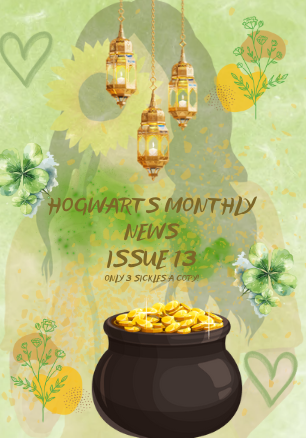Hogwarts Monthly News (Issue 13)
By Hazel Emory Antler
Welcome back, all readers, to another issue of Hogwarts Monthly News! Apologies for the long delay - I promise it won't happen again. Hidden inside the cover of this book are leprauchans, water balloons, feminism, candles, art, and so much more! So what are you waiting for? OPEN ME! (1 Copy = 3 sickles.)
Last Updated
April 26, 2025
Chapters
25
Reads
165
Magical Criminal Law 6 - The Trial Of Jackson Christial
Chapter 18
In the series of articles in the coming months, a sequence of magical historical criminal trials will be read through, explained, and given the outcome.
People v Jackson Christial (2019)
INSTANT FACTS: In the wizarding town of Eldoria, young Jackson Christial was stopped and searched by an Auror who suspected him of preparing to cast dark magic in a crowded wizarding square.
BLACK LETTER RULE: An Auror may stop and frisk a wizard if they have reasonable suspicion. This is based on specific and articulable facts; if the wizard is engaged in criminal activity, they may also pose a danger.
Procedural Basis:
Brought to the Wizengamot after Jackson Christial argued that they could not be stopped and frisked based on suspicion.
Facts:
Darius Christial, a well-known spell crafter, was walking through Diagon Alley late at night. Senior Auror Graves observed Christial whispering incantations under his breath and repeatedly reaching into his enchanted robe pocket. Graves, a seasoned investigator, had seen similar behavior from dark wizards preparing hexes in the past. He noticed Christial’s eyes darting toward the entrance of Gringotts Bank and a sudden shift in his stance, which Graves interpreted as preparation to cast.
Believing that Christial was about to engage in illegal spellwork, Graves approached, identified himself, and without waiting for a reply, he performed a brief wandless detection spell, which revealed an active defensive charm on Christial’s person. He then conducted a full search, retrieving a restricted potion and an advanced dueling wand, both concealed within hidden pockets. Christial protested, arguing that he had been preparing a simple shield charm to protect himself from potential pickpockets. However, Graves, citing prior experience, insisted that the behavior was suspicious enough to justify the search.
Christial was subsequently charged with unlawful possession of restricted magical items. At trial, Christial’s defense argued that Graves lacked sufficient justification for the stop, and the search violated fundamental wizarding rights under the Eldorian Magical Charter. The prosecution countered that the search was justified under established Auror precedent, as Christial’s behavior met the threshold for reasonable suspicion.
Issue:
Is evidence obtained by the use of a stop-and-frisk based on suspicion allowed in court?
Decision & Rationale:
(Densburo, C) Yes. The High Wizengamot ruled in favor of the prosecution, upholding the search as lawful. In its reasoning, the court emphasized the importance of preventing potential dark magic incidents in crowded areas. The justices found that Graves' observations—Christial’s nervous demeanor, whispered incantations, and reaching into his robe—constituted specific and articulable facts that justified reasonable suspicion. The court also noted that Aurors, much like their Muggle counterparts, must balance personal liberties with public safety. In their justification, they determined that, given the history of dark wizards using similar tactics to prepare for attacks, Graves' actions were reasonable. The presence of restricted magical items further supported the legitimacy of the search. On the other hand, the ruling also clarified that Aurors cannot conduct arbitrary searches based on vague hunches. Cases in the future would require a clear demonstration that an officer’s suspicions were grounded in identifiable conduct. One dissenting justice argued that the stop and search infringed on the rights of law-abiding wizards who may exhibit nervous behaviors without ill intent. They warned that upholding the search risked giving Aurors excessive discretion, leading to potential abuses of power. Ultimately, People v. Christial established that Aurors may conduct stop-and-frisk searches when reasonable suspicion is supported by specific conduct indicative of criminal activity. The case reinforced the principle that while personal freedoms are vital, public safety concerns can, in certain circumstances, justify limited intrusions on those freedoms.
Written by Michael Isserles.
Edited by Sam Diggory.
Proofread by Daphne Clarke.



